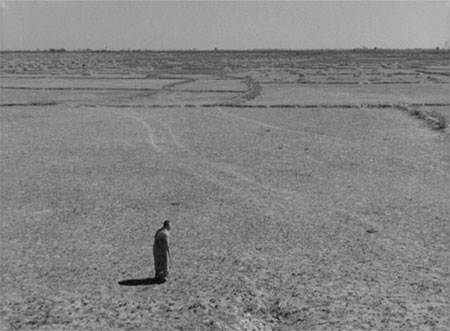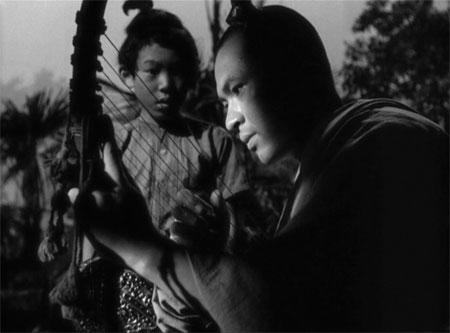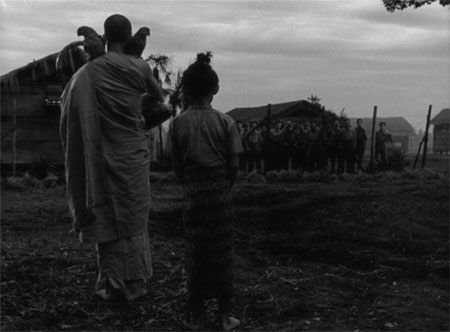A part of this viewing list: Criterion Collection Spine #379: Kon Ichikawa’s The Burmese Harp.

The Burmese Harp seems less the anti-war film it is often billed as, and more of a post-war re-evaluation of Japanese nationalism. For practical purposes there are two characters in this film, the deserter Mizushima and the rest of his battalion. After the Japanese surrender, both characters find themselves bereft and in search of a new direction now that their ideology of Imperial Japan no longer exists. This loss is compounded by their expatriation in Burma and British captivity; they are orphaned in a foreign land and unable to return to their home for healing. Because of this it is not surprising that they cling to one another; when Mizushima goes missing after an attempt to save the lives of some stalwart Japanese holdouts, the rest of the battalion spends the film concerned with his discovering his whereabouts and then convincing him to come home with them.

Mizushima’s failure to convince the Japanese at Triangle Mountain to surrender, and their resulting destruction in his presence [and his wounding], are life-changing events. He is nursed by a Buddhist monk and convinced to rid himself of the past and take vows. Yet, for a man who has sworn to start anew, he has a torturous time coming to grips with this. On his journeys he repeatedly stumbles across the unburied and unmourned corpses of Japanese soldiers. The emotional toll this takes on him doesn’t reach its peak until he arrives in Mudon and watches the burial of a British soldier with full honor. Distraught, he heads back into the wilderness to bury his dead brothers at arms, by hand. This vaguely penitential purpose brings him great respect all over Burma; instead of inflicting suffering as a solider, he endures his own to ease that of others.
I’ve not yet mentioned the role that music plays in this film, and it is an important one. The battalion captain is a trained choirmaster and in the rough times in the Burmese jungle trains his men in the ways of choral singing. Mizushima plays the role of accompanist with his Burmese harp. The music throughout the film is outstanding, and it even saves the Japanese lives on the night of their surrender, as the tune they sing is well-known to the British. At the very beginning of the film, the captain says that the ease of singing is meant for times of suffering, and there seems to be a direct correlation between his battalion’s reasonableness and rationality in contemplating surrender and their love of music. The contrast to this is the resistant honor-unto-death attitude of the Japanese at Triangle Mountain. Thus, Mizushima’s spiritual journey contains a component of tension between these two attitudes as well.

In the end the battalion and Mizushima take inevitable separate paths toward the same goal. The battalion is eager to continue in its component lives back in Japan, and Mizushima is focused on putting to rest all of his dead comrades. Everyone is moving on and coming to terms with their new lives. Mizushima’s monastic life intersected the battalion’s in a way that made him truly seem dead to the past, a silent ghost, except for the music of the Burmese harp; a reminder that there are ties that bind between culture, distance, religion and even death. This is a beautiful, wretched movie, definitely the kind of film meant for the Criterion Collection.

- Criterion Essay by Tony Rayns.
- Stylus Magazine review.
- Strictly Film School review.
- Kon Ichikawa Interview Part 1; Part 2
- Rentaro Mikuni Interview Part 1; Part 2